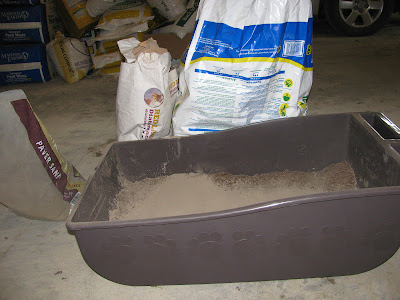Chickens naturally take dust baths as a way to get rid of external parasites. They throw themselves down in a dusty spot and roll around until they get dirt in all their nooks and crannies. Dust baths are very effective but even so, chickens can still suffer from lice and mites. You can soup up your chickens' dust baths by providing them with a box filled with pest repellent materials. Here's how to do it.
Go and get the biggest litter box you can find.
 |
This giant litter pan is 34.5" x 19.5" x 10". Two chickens could bathe in here at the same time. The depth is the most critical dimension. You want all your bathing materials to stay in the box when the chickens do their thing. (Ever watched a chicken dust bathe? They can go kinda crazy.)
is 34.5" x 19.5" x 10". Two chickens could bathe in here at the same time. The depth is the most critical dimension. You want all your bathing materials to stay in the box when the chickens do their thing. (Ever watched a chicken dust bathe? They can go kinda crazy.)
 |
| Adding the first layer of peat moss |
You can fill your dust box with any number of materials. Harvey Ussery recommends peat moss, dried and sifted clay, and/or small amounts of wood ash. I used peat moss because I had some on hand plus some sand I had left over from another project.
 |
| Food-grade DE. Do NOT use any other type of DE with your poultry. |
Now for the good stuff. You can add garden lime, food-grade diatomaceous earth (DE), or elemental sulfur powder to really sock it to those parasites. Remember to wear a good dust mask whenever you work with DE. It is really fine and you'll breathe it in and irritate your lungs.
I should mention that Gail Damerow, author of Storey's Guide to Raising Chickens, doesn't think you should use DE in dust boxes for parasite prevention. Chickens can be prone to respiratory problems and breathing in DE is not a good thing for anyone. Damerow thinks you should only use DE and other heavy-hitting anti-parasite products when there is an obvious infestation. Herbalist Susan Burek has also been outspoken about her opposition to DE in her articles in Backyard Poultry Magazine. Harvey Ussery, on the other hand, routinely uses a small amount of DE in his dust box. You'll have to decide where you stand on this issue. I do generally use DE as part of my dust box mix.
I also mix a little DE in with my chickens' feed. Some people claim that feeding DE to poultry will serve as a natural dewormer. Gale Damerow has a negative opinion of that as well. She says that DE only works to kill worms, etc. when it is dry. Once it has made its way through the chicken's digestive tract, it is not dry and no longer has any of the microscopic cutting edges that serve to kill the bad guys. I still do it on the off chance that it will work!
 |
| Peat, sand, and DE, ready to be mixed |
The dust box should be placed where it will stay dry.
 |
If the mixture gets wet, it defeats the purpose. You should place it in a sheltered area or in your coop if you have room.
That's it! Pretty simple for something that can really improve your chickens' quality of life.
References:
2. Storey's Guide to Raising Chickens, 3rd Edition
Note: Links included in this post are affiliate links. Click here to read our disclosure statement.








